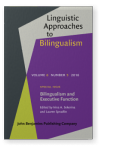Klara Marton
List of John Benjamins publications for which Klara Marton plays a role.
2019 Chapter 7. Interference control in bilingual auditory sentence processing in noise Bilingualism, Executive Function, and Beyond: Questions and insights, Sekerina, Irina A., Lauren Spradlin and Virginia Valian (eds.), pp. 103–116 | Chapter
Listening to speech in the presence of interfering auditory stimuli is a well-studied phenomenon in second language (L2) listeners. L2 auditory processing has been associated with various individual factors, such as listeners’ L2 linguistic and contextual knowledge and L2 proficiency (Cutler, 2005). read more
2019 Chapter 17. Executive control in bilingual children: Factors that influence the outcomes Bilingualism, Executive Function, and Beyond: Questions and insights, Sekerina, Irina A., Lauren Spradlin and Virginia Valian (eds.), pp. 265–279 | Chapter
While findings on the bilingual advantage in adults are mixed, the data from children are more consistent but still show variations. A number of factors influence the outcomes, such as individual bilingual characteristics, variations in target functions, and differences in task type. Our goal is to… read more
2019 Chapter 18. Interactions among speed of processing, cognitive control, age, and bilingualism Bilingualism, Executive Function, and Beyond: Questions and insights, Sekerina, Irina A., Lauren Spradlin and Virginia Valian (eds.), pp. 281–293 | Chapter
Bilingual children often exhibit superior speed of processing compared to monolingual peers in cognitive control tasks (e.g., Bialystok, 2010). In this chapter, we focus on the interactions among processing speed, cognitive control, age, and bilingualism. Individual differences in speed of… read more
2016 Executive control in bilingual children: Factors that influence the outcomes Bilingualism and Executive Function: An interdisciplinary approach, Sekerina, Irina A. and Lauren Spradlin (eds.), pp. 575–589 | Article
While findings on the bilingual advantage in adults are mixed, the data from children are more consistent but still show variations. A number of factors influence the outcomes, such as individual bilingual characteristics, variations in target functions, and differences in task type. Our goal is… read more

